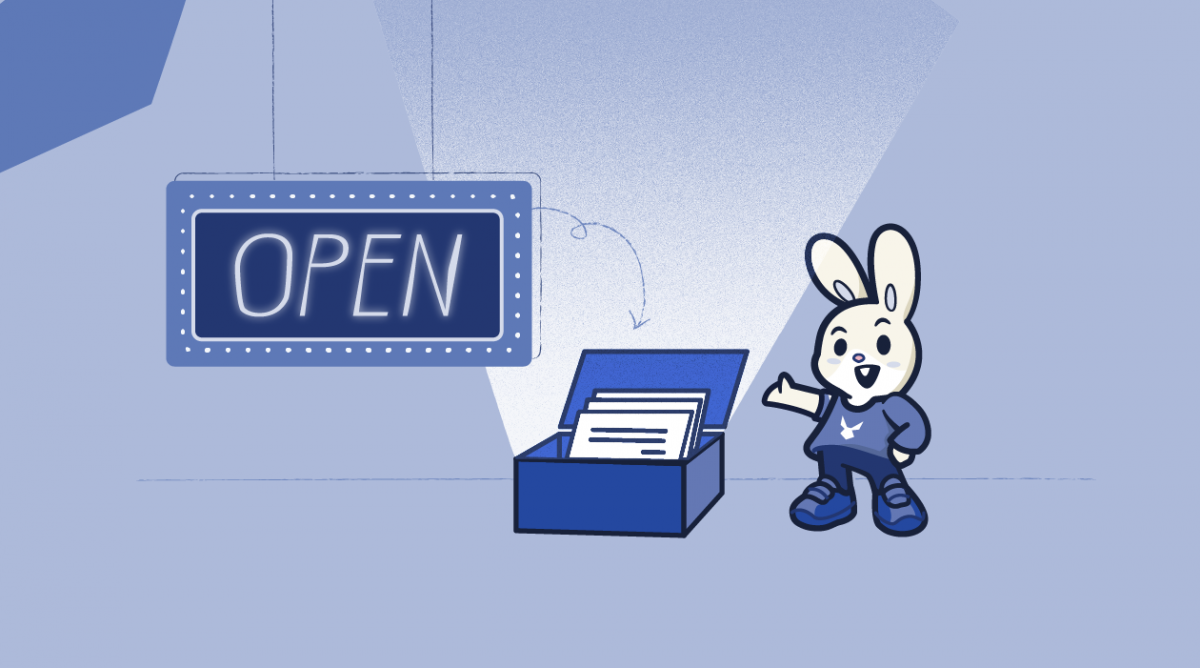Back in the day, salaries were one of the things on the Do Not Speak About list. But is that really the best thing? So many topics are not as hush-hush as they once were, and that’s kind of good for everyone. Check out why here at Bunny Studio, we believe an open salary policy is the best way to go, and you can also learn some pros and cons of an open salary policy.
What is an open salary policy anyway?
Just like it sounds, an open salary policy is one that makes everyone’s salaries available for all to see. The Motley Fool shares some good information for us about this, including the fact that an open salary policy is good for both employees and the business itself. Some companies share this on a spreadsheet, some on other accessible files. Take some public organizations, like public schools – you can go to their website and pull up any employee’s salary. Now more and more other companies and businesses, big and small, are doing this.
Why don’t we talk about salary (or why didn’t we)
There used to be those things people didn’t talk about, religion, politics (oof), sex, and money. Now many of us talk about these quite openly; most Gen Xers are more than happy to get into deep discussions about any of these, while the baby boomers still keep these things closed up and private. But why? Why does this make some people uncomfortable? Why was it so taboo to talk about salary and money?
The article, Why Can’t We Talk About How Much We Make, shares some great insights. For instance, if someone makes more than their friends, they feel this weird sense of guilt. If they make less, they tend to think their peers will feel bad for them. Generations ago, parents did not talk about money with their children. If money was tight, they didn’t mention it, if it was abundant, they still didn’t mention it.
There is a certain “wealth guilt” that people with more money than others feel. And all of that flows into salaries. Do you talk about your salary with a coworker and then feel resentment because they make more or guilt because you do? Ahhh so many subtle nuances here. But isn’t it that way with almost any taboo subject? So the trick is – take away that taboo, that secrecy, and let money be an acceptable topic of conversation, no matter how much, or how little you make.
The precursor to an open salary policy
Before we even get into the pros and cons of an open salary policy, let’s talk about the precursor to this policy. What we want to mention is that we all want to know what we are going to make before we accept a job. Often we want to know before we apply for a job, or to take it one more precursory step, before we go into a certain field.
You can look up most any salary or wage when you’re researching a job. For instance, if you want to know how much a graphic designer earns or what a voice actor makes, do a bit of research and you’ll find it. If you want to know what a teacher or engineer or content writer makes, it’s not hard to find. So again, why should we be secretive? We all know doctors and baseball players make great money, whereas maybe teachers and firefighters should make a bit more.
But let’s stick to the topic and talk about that open salary policy. This goes beyond just knowing a ballpark figure of what certain positions in certain fields make. It’s a true list of who makes what in a company. So is this a good thing, or maybe not such a great thing? the truth is, there are both pros and cons of an open salary policy. But here at Bunny Studio, we truly feel the pros outweigh those cons, and it’s worth it to us to have that open salary policy.
Let’s begin with the pros…
The pros of an open salary policy
Because transparency is something people crave and value these days, the open salary policy is something more and more professionals want to see in their place of work. Even if you never go look at that spreadsheet, you know it’s there. That in and of itself can offer a sense of fairness and trust that your company is sincere and authentic.
The Motley Fool piece we mentioned earlier shares some strong benefits of an open salary policy. One of the main ones is that an open salary policy can lead to the reduction of wage gaps. It’s tough to have the white males making more than their equivalent counterparts when there is an open salary policy. We are going to touch on this one in a bit…it’s too important not to.
An open salary can lead to more open minds. When you can see what your peers are making in a public way, you may look at it in a more open-minded sense. If you learn through some sordid grapevine that Reggie is making thousands of dollars more than you for the same position, you may be angry and resentful. But if the salaries are open, you may be more prone to accept that people make different numbers. Maybe Reggie had more experience or has a different degree than you. With an open salary policy, people don’t feel that things are hidden for unknown reasons.
Open salary policies also lead to more company loyalty and more competition and motivation among employees. Maybe because you know that Anika is making more than you, you’re inspired to strive for another degree or certification like she has. It’s not resentment, it’s a healthy inspiration.
And one more pro, it breeds into the company culture. People today want open, sincere companies where they know they are valued. The more open that any policies are, the less you feel there’s a hidden agenda. It’s the culture people want these days. It must be a good thing.
The cons of an open salary policy
Most good things don’t come without some negative components. So what are the cons of an opens salary policy? Let’s start with one of the most obvious ones…resentment and disgruntlement. Say, for instance, you get a new employee who is going to work under you. All is well until you see her salary. It’s more than yours. You wonder how this will play out and begin to feel bad about the whole dynamic. This isn’t good for anyone related to the situation.
It goes against what many people have been traditionally taught. If you come from a family where you were taught to not discuss money, or you come for a company that kept salaries private, you may feel unsure about this, almost as if you’re taken advantage of. It can be tough for some people to adapt to this.
People can make assumptions and take things out of context. Some of the salary factors could be subjective or simply things that aren’t obvious, like degrees or years of experience. Rarely are things black and white, and people can have a tendency to assume or read too much into things which can lead to negative feelings when salaries are disclosed.
It can become a tool for recruiting. This really is only a negative for the company, not the employees. If another company knows exactly what someone is making, they can offer more right off the bat. However, if they are determined to woo an employee away, they will find out eventually if the employee is interested.

Back to the wage gap
We wanted to touch on this one again. This is a pretty big deal when it comes to equal pay, and an open salary policy can help close the gap. If women or people of color don’t know their male/white counterparts are making more money, they don’t have the knowledge to demand more for the same work. Perhaps this can put the companies ahead of this, and because they know that salaries will be public, they will pay more equally.
Knowledge is power, and power must be used wisely. Remember, a lot of factors go into salary, so though it’s relevant to know what others earn, it needs to be taken with understanding and objectivity.
Here’s what we think at Bunny Studio
We talked with our Head of People Operations, Maika Hoekman, here at Bunny Studio to gain even more insight on this concept.
Here’s what we learned from Maika:
Have you had any negative feedback on this policy?
No! People are usually pleasantly surprised when they learn about it. Especially when I share the document with candidates who are interviewing for a position and would like more clarification on how we manage our salaries or are doubting about the amount
Could this policy work at any company or business?
Yes. They’ll just need to have the courage and money to do it. They’ll have an opportunity to close pay gaps.
Do you think it increases productivity within Bunny Studio?
With a transparent salary structure, a relationship of trust is created between the leadership team and team members. By doing so, we ensure that both the company and the team member expectations are appropriately set and fulfilled. Moreover, it improves communication and morale. This reinforces honest and open communication within Bunny Studio which drives a greater level of engagement from our team members. With clear, open, and frequent communication, employees are less likely to make false assumptions about their job or their organization. In the end, it does have an effect on the long-term success of the company.
How does an open salary policy help to equalize the gender pay gap and wage disparity?
Having a clear and transparent salary structure also allows for no negotiation, an area where women tend to lag behind.
Please share with us a brief understanding of why an open salary policy is the best route for Bunny Studio.
We have this transparency because we believe it is important for team members to know where they stand, what their growth opportunities are, but most importantly to ensure that we push for equality across the whole organization to avoid a gender pay gap. We always strive for honest and open communication so it is logical for us to also have transparency on our salary policy.
The bottom line on the open salary policy
We can see that the open salary policy is a good thing. Two big reasons are the productivity it instills in the employees and the balance of the wage gap. The no-talk of salary days are gone, and by making salaries an open conversation, people can strive to gain equal pay for equal work. Employee happiness, productivity, and healthy salaries make for a good company, don’t you think.
If you’d like to read more about our company policies, check out our blog at Bunny Studio Library, and if you’d like to find out how to partner with us, either as a client or pro, you can find that information here.










